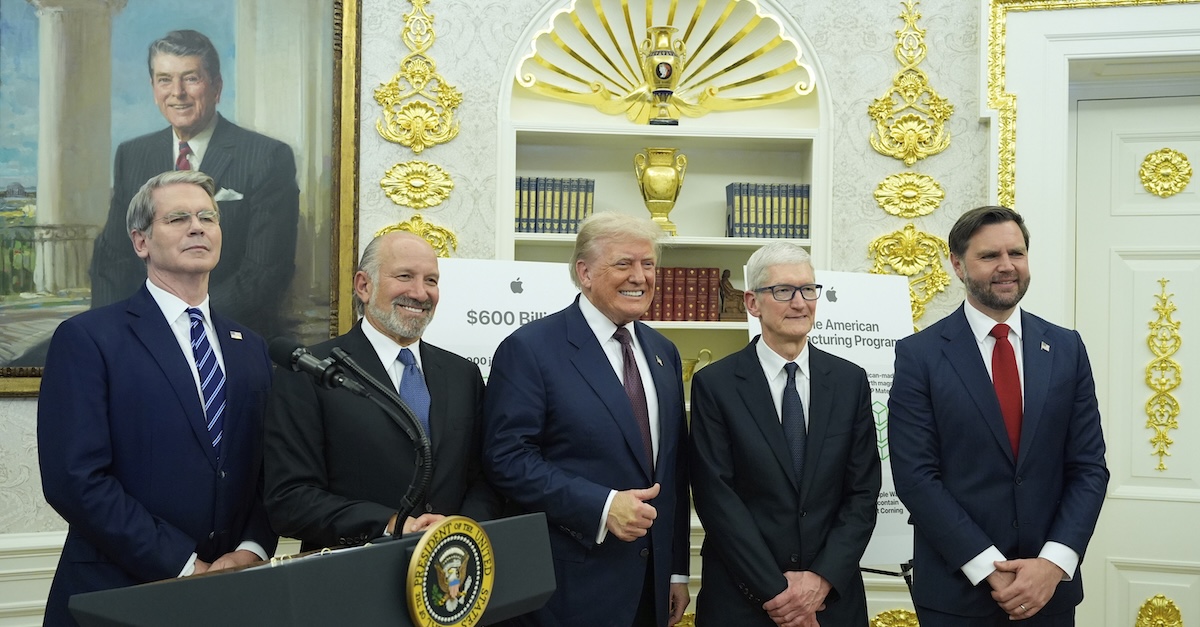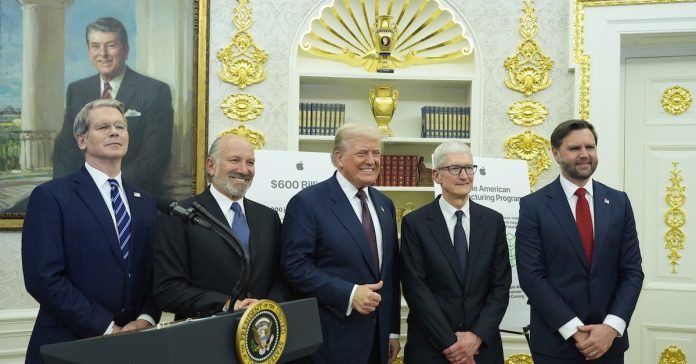
From left, Treasury Secretary Scott Bessent, Commerce Secretary Howard Lutnick, President Donald Trump, Apple CEO Tim Cook and Vice President JD Vance, pose for a photo after President Trump made an announcement about Apple, in the Oval Office, Wednesday, Aug. 6, 2025, in Washington. (AP Photo/Alex Brandon)
President Donald Trump and his Treasury Secretary Scott Bessent are pleading with the U.S. Supreme Court to find, on an expedited basis, that the commander-in-chief”s International Emergency Economic Powers Act (IEEPA) tariffs are lawful — or else place America back on the “brink” of economic “catastrophe.”
Trump’s personal attorney turned U.S. Solicitor General D. John Sauer, in filings first spotted by Politico, urged the high court to fast-track the case, granting the administration’s petition for a writ of certiorari as soon as Sept. 10 and ordering up “expedited consideration of the merits to the maximum extent feasible” — because even the V.O.S. Selections plaintiffs who have successfully challenged the tariffs up to now don’t mind that schedule.
“Respondents have indicated that they will acquiesce in, or not oppose, certiorari, and that they agree to a schedule with a decision on the petition by September 10, the government’s opening brief on the merits filed by September 19, respondent’s brief filed by October 20, the government’s reply filed by October 30, and oral argument in the first week of November. The government agrees to this schedule as well,” the government said.
The requests come In the aftermath of the U.S. Court of Appeals for the Federal Circuit’s 7-4 ruling in August that Trump’s unilaterally imposed trade deficit emergency tariffs were unconstitutional.
“We are not addressing whether the President’s actions should have been taken as a matter of policy. Nor are we deciding whether IEEPA authorizes any tariffs at all. Rather, the only issue we resolve on appeal is whether the Trafficking Tariffs and Reciprocal Tariffs imposed by the Challenged Executive Orders are authorized by IEEPA. We conclude they are not,” the opinion said, leaving the tariffs in place anyway.
In mid-April, V.O.S. Selections, an alcohol importer, along with other businesses, filed a lawsuit against the tariffs regime, alleging general tumult with pricing, shipping, product selection, inventory levels, reduction in cash flow, and reduction in purchase orders. In late April, a coalition of 12 Democratic Party-led states filed a separate and similar challenge to Trump’s tariffs. The cases were later consolidated.
At oral argument, appellate judges noted that the IEEPA statute Trump cited to justify the tariffs didn’t mention the words “tariffs” or duties “anywhere.”
Love true crime? Sign up for our newsletter, The Law&Crime Docket, to get the latest real-life crime stories delivered right to your inbox.
The administration’s ensuing petition for a writ of certiorari asks SCOTUS to confirm, however, that the IEEPA “authorizes the tariffs imposed by President Trump pursuant to the national emergencies declared” and, if so, “whether the statute unconstitutionally delegates legislative authority to the President.”
Sauer’s separate motion for expedited consideration at SCOTUS, emphasizing the “enormous importance” of a quick ruling, stated that the “erroneous decision has disrupted highly impactful, sensitive, ongoing diplomatic trade negotiations, and cast a pall of legal uncertainty over the President’s efforts to protect our country by preventing an unprecedented economic and foreign-policy crisis.”
The motion also included a declaration from Treasury Secretary Scott Bessent, asserting that the Federal Circuit’s striking down of the tariffs as unlawful has “gravely” imperiled “ongoing negotiations” with other countries and existing agreements, while also opening the door to “catastrophic” consequences in the economic sphere.
Bessent struck a tone that resembled an August filing from Sauer, where the latter insisted the judiciary was on the verge of plunging America into “1929-style” crisis.
For Bessent, if SCOTUS affirms the IEEPA tariffs are unlawful, that would cut against Trump’s presidential determination that America is on the “brink of a major economic and national-security catastrophe” and would take the country back to the late 2000s.
“The United States has suffered trade imbalances for many decades at the hands of its major trading partners and their imposition of asymmetrical, higher tariffs on us than we imposed upon them. In 2025, President Trump and his senior economic advisors concluded that the decades of cumulative, uncorrected trade imbalances had brought the United States to a ‘tipping point,’ i.e., the brink of a major economic and national-security catastrophe,” Bessent declared, under penalty of perjury. “The United States had last experienced an economic ‘tipping point’ back in 2007, when almost no one foresaw or took any action to prevent the 2008 mortgage crisis. Emergency action is warranted to prevent a financial shock.”
Colin Kalmbacher contributed to this report.

